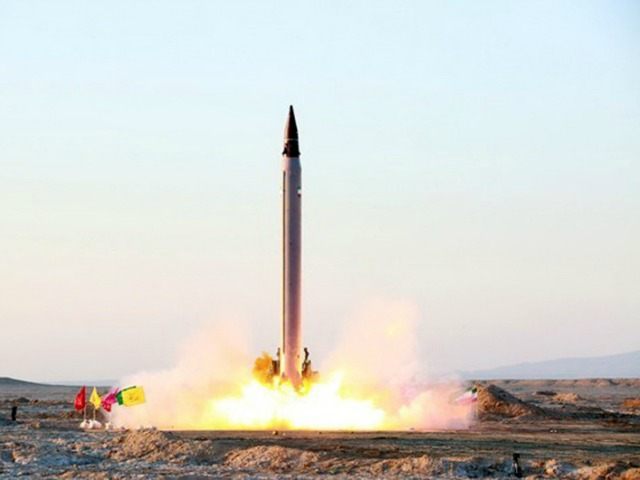Iran conducted another round of illegal ballistic missile tests on Tuesday, and they may prove to be an even more egregious violation of sanctions than the launch in October. Iran openly defied the United Nations and United States — which an Iranian general described as “our main enemy” — and threatened to walk away from President Obama’s nuclear deal.
“State media announced that short-, medium- and long-range precision guided missiles were fired from several sites to show the country’s ‘all-out readiness to confront threats’ against its territorial integrity,” AFP reported. The Iranian broadcasts included pictures of the launches, which included ballistic missiles with ranges of up to 2,000 kilometers.
AFP notes these missile exercises were dubbed “The Power of Velayat” by Iran, a “reference to the religious doctrine of the Islamic republic’s leadership.” More specifically, it apparently refers to a book by the revolutionary Ayatollah Khomeini, in which he argued that Islamic sharia law should rule over secular government, administered by clerical “guardians” — the essence of “hardline” political thought in Iran.
The launches were conducted by the Iranian Revolutionary Guards Corps, which is under the command of Supreme Leader Ayatollah Ali Khamenei, not President Hassan Rouhani. This leads to suspicions the missile tests were a demonstration of internal power and international defiance by the Iranian “hardliners,” after big “moderate” victories in the recent Iranian parliamentary elections.
“Our main enemies, the Americans, who mutter about plans, have activated new missile sanctions against the Islamic Republic of Iran and are seeking to weaken the country’s missile capability,” said IRGC Brigadier General Amir Ali Hajizadeh in a TV interview. “The Guards and other armed forces are defenders of the revolution and the country will not pay a toll to anyone… and will stand against their excessive demands.”
For all his alleged “moderation,” AFP notes that President Rouhani said in response to the prospect of fresh sanctions against Iran over missile violations: “Any action will be met by a reaction.”
Those reactions include a threat to walk away from Obama’s nuclear deal, if the U.S. insists on holding Iran to parts of the deal it doesn’t like.
“If our interests are not met under the nuclear deal, there will be no reason for us to continue. What makes us remain committed to the deal is our national interests,” Iranian Deputy Foreign Minister Seyed Abbas Araqchi said on Tuesday, during an address to an Iranian legal council. He implied that it would be America that nullified the deal, by imposing any further sanctions against Iran.
CNN quotes U.S. State Department spokesman Mark Toner saying on Tuesday that if the Iranian missile launches were confirmed as violations of U.N. Security Council resolutions, the U.S. would ask the United Nations to take an “appropriate response,” without specifying what that response might be.
“There are strong indications (this) test is inconsistent with U.N. Security Council 2231,” said Toner, referring to the relevant United Nations resolution. “If confirmed, we intend to raise the matter in the U.N. Security Council. We will also encourage a serious review of the incident and press for an appropriate response.”
There is some question about precisely what Iran launched last night, as Reuters notes images broadcast on Iranian TV of the most advanced missile Iran claimed to test, the Emad, appeared to come from the October test. The administration will want to confirm illegal missile tests before taking any further action.
In addition to the belligerent statements of defiance quoted above, the Iranian government argues that these missile tests were not violations of the Security Council resolution Toner cited, because the missiles cannot carry nuclear warheads.
On Tuesday afternoon, the White House said the Iranian missile launch was not a violation of the nuclear agreement, although the question of whether they violated U.N. Security Council resolutions remains:

COMMENTS
Please let us know if you're having issues with commenting.